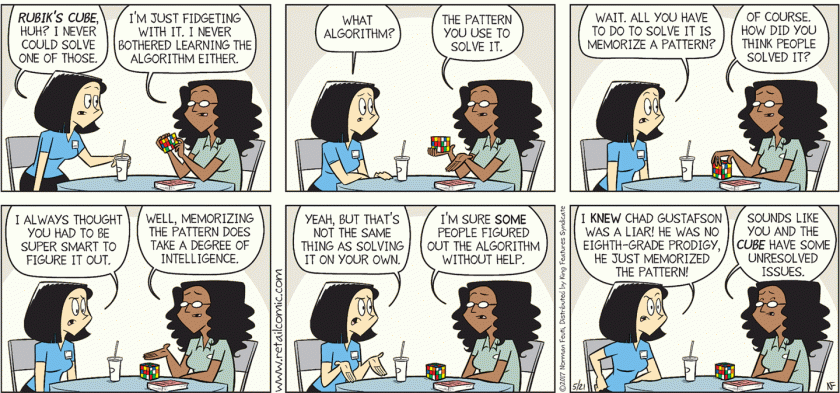Can’t say this was too fast or too slow a week for mathematically-themed comic strips. A bunch of the strips were panel comics, so that’ll do for my theme.
Norm Feuti’s Retail for the 21st mentions every (not that) algebra teacher’s favorite vague introduction to group theory, the Rubik’s Cube. Well, the ways you can rotate the various sides of the cube do form a group, which is something that acts like arithmetic without necessarily being numbers. And it gets into value judgements. There exist algorithms to solve Rubik’s cubes. Is it a show of intelligence that someone can learn an algorithm and solve any cube? — But then, how is solving a Rubik’s cube, with or without the help of an algorithm, a show of intelligence? At least of any intelligence more than the bit of spatial recognition that’s good for rotating cubes around?

I don’t see that learning an algorithm for a problem is a lack of intelligence. No more than using a photo reference shows a lack of drawing skill. It’s still something you need to learn, and to apply, and to adapt to the cube as you have it to deal with. Anyway, I never learned any techniques for solving it either. Would just play for the joy of it. Here’s a page with one approach to solving the cube, if you’d like to give it a try yourself. Good luck.
Bob Weber Jr and Jay Stephens’s Oh, Brother! for the 22nd is a word-problem avoidance joke. It’s a slight thing to include, but the artwork is nice.
Brian and Ron Boychuk’s Chuckle Brothers for the 23rd is a very slight thing to include, but it’s looking like a slow week. I need something here. If you don’t see it then things picked up. They similarly tried sprucing things up the 27th, with another joke for taping onto the door.
Nate Fakes’s Break of Day for the 24th features the traditional whiteboard full of mathematics scrawls as a sign of intelligence. The scrawl on the whiteboard looks almost meaningful. The integral, particularly, looks like it might have been copied from a legitimate problem in polar or cylindrical coordinates. I say “almost” because while I think that some of the r symbols there are r’ I’m not positive those aren’t just stray marks. If they are r’ symbols, it’s the sort of integral that comes up when you look at surfaces of spheres. It would be the electric field of a conductive metal ball given some charge, or the gravitational field of a shell. These are tedious integrals to solve, but fortunately after you do them in a couple of introductory physics-for-majors classes you can just look up the answers instead.
Samson’s Dark Side of the Horse for the 26th is the Roman numerals joke for this installment. I feel like it ought to be a pie chart joke too, but I can’t find a way to make it one.
Izzy Ehnes’s The Best Medicine Cartoon for the 27th is the anthropomorphic numerals joke for this paragraph.
One thought on “Reading the Comics, May 27, 2017: Panels Edition”